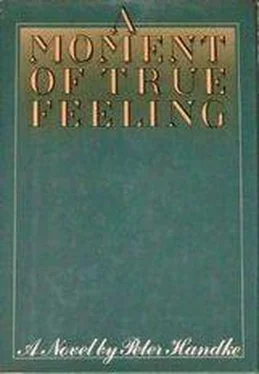While roaming from place to place he absently read the print on some circular that was lying around. When at the end of it he sighted the words “Yours very truly,” he felt they were addressed to him personally, and that encouraged him. Avidly he reread the whole circular. “We congratulate you — you have made a good purchase.” He found a picture postcard he had received from a vacationing woman friend: “I dreamed of you last night and I am thinking of you now.” He read all the letters that had come in the last few days. How tender they were, how wistful — as though people not only slept longer and had sweeter dreams during their summer vacations but took their dreams more seriously. — Still, it depressed him to recognize the handwriting on an envelope. He longed for a letter from someone he didn’t know.
He washed the night’s dishes, ironed a few handkerchiefs, and sewed a snap on one of Agnes’s dresses. He was very pleased with himself when he had finished, and kept going back to look at his handiwork. He thought of Stefanie, who had spent most of her life either at home with her parents or at a girls’ boarding school, and how grateful she had been when they went to a restaurant together and she didn’t have to eat everything on her plate. The way she’d looked at him — on the verge of tears …
He played cheerful, whistling and humming for fear that too much quiet would upset Agnes in the next room. “Stop it!” she cried. What could he do to amuse her? Once, when he bumped into something, he exaggerated the pain and shrieked, in the hope of relieving the monotony. Then he asked “Do you want an apple?” in a tone suggesting that the apple was THE IDEA. Before washing the apple, he made an extra trip to show it to her. That was a way of communicating with her, he couldn’t think of any other. “Look how red it is!” he cried, affecting surprise in the hope that she would be surprised. The redness of the apple was bound to teach her something that he himself could not. He was terrified that she would ask him: “What should I do now?”—because he would have nothing whatever to suggest.
He decided to go to the kitchen. On the way, it suddenly seemed important to look up a certain restaurant. But instead he searched the guides in vain for another restaurant, on the seaside, where he had once been served a pâté maison with sand in it. He resumed his trek to the kitchen, but turned back because there was still an ash tray that needed emptying in the dining room. Then he remembered all the unmade beds and, still holding the full ash tray, went to make them. But first he wanted to put out the light in the bathroom. On the way he saw a newspaper and stopped to read it … Then at last he went to the kitchen and turned on the water without knowing why; after a while he turned it off again.
In his benumbed state of mind he hoped for a sign, and when he threw the apple core into an empty tin pail and hit the inner wall, there was indeed something menacing in the sound. Quickly he threw the core again, making sure it hit the bottom of the pail, which did not resound. A shirt was slowly slipping off a clothes hanger, and he couldn’t stop it in time! To compensate, he quickly smoothed out the creases in one of the child’s drawings and straightened a pair of shoes, one of which had been resting alarmingly on the other. The door to the storeroom was open a crack; he ran and closed it, thinking: I’ll laugh about this later on. — He went out into the garden and the soft summer breeze soon relieved his oppression. Then a child screamed pitifully on one of the upper floors, and at the same time the clock in the church steeple struck — and again irresistible terror assailed his ears. A chill ran through him. He rushed into the house and phoned Beatrice. “I’m coming over right away.” “As you like,” she answered, and waited before hanging up, almost as though expecting him to ask: Is it all right with you? — But already he was ruthlessly on the way to the door with Agnes.
He locked all three locks from outside, each time turning the key twice, as though to gain time in opening them again when he came home. In the shade of a plane tree beside the railroad cut the concierge and his wife, who had little to do in the house during the summer months when most of the tenants were away, were sitting on a bench that had been painted a light color. They were very old. The husband had his arm around his wife, who was knitting. A ball of wool lay beside her on the bench, and at his feet there was a bird cage with quite a few canaries hopping around in it. They’ll be able to testify that they saw me here in the late forenoon of such and such a day, thought Keuschnig involuntarily, and called out a greeting to them from across the boulevard — as though he would soon need witnesses in his favor. And with the child, he also struck himself as less conspicuous. Oh, to achieve blissful innocence with her help! he thought suddenly. — In the corner restaurant the tables were already spread with white tablecloths and set for lunch, and out in front the patron was walking up and down with his dog. Him, too, Keuschnig greeted distinctly; if the worst came to the worst, the man would testify in his favor. On the restaurant window he caught sight of a handwritten sign he hadn’t seen the night before, to the effect that “the house” no longer accepted checks. He had never paid with a check at this restaurant and now for the first time he felt a bond with the patron, for he was an honest customer and not “one of those.” I need witnesses, he thought, and wanted to be with Beatrice right away. At last the flashing, swift-flowing water in the gutter was having its old effect.
A taxi-ride in pleasant inattentiveness; no other feeling than that of being driven through deserted summery streets. Absently backing into the elevator with the child, who was speechless with curiosity; guilelessly tugging the bellpull, without a thought of preparing his face; then standing with his back to the opening door like a constant visitor, as though it couldn’t possibly be anyone else.
“Oh, it’s you,” said Beatrice. She was very friendly to Agnes and took her to play with her own two children in their room. As though to show that he had changed and was willing to have things done for him, he asked her to get him a drink. “You know where the bottles are,” she said. Still exhilarated by the sensation of riding, he went to the kitchen, and on the table saw the cup Beatrice had drunk her tea out of that morning. She sat there alone, he thought, and all at once it seemed to him that he understood her bitterness. He hurried back to her, threw his arms around her, and said sanctimoniously: “I love you.” She looked at him in surprise and said: “Go and wash. You look so dirty.” He went whistling to the bathroom and washed his face. He wouldn’t let anything discourage him. But at the sight of all the tubes, the hand cream, the foot cream, the toothpaste, so neatly squeezed from the bottom up, he was struck with the certainty that he was now irrevocably excluded. Far, far away the three children were imitating the voices of the birds outside.
He sat down across from Beatrice. For a long while she looked at him, but asked no questions. Soon she would begin to think of something entirely different, and it would be all over between them. Suddenly everything hung in the balance; one more wordless moment and he would be an importunate stranger for her. Already a long breath escaped her in the silence and she started looking at something else … He tried hurriedly to talk, to tell her about a restaurant under mulberry trees on the Yugoslavian coast … Up until then she had turned all his stories into projects for the future: “Someday I’ll go to that restaurant with you; next time we’ll visit that coast together!” Now she responded with silence. He tried memories they had in common, but again there was no answer. Today the teasing remarks that had always made her laugh left her cold. She wanted no part in their tacitly agreed-on games. But perhaps that meant she expected more of him. He sat down beside her. It wasn’t until he had thought for a moment of the child in the next room that he found it natural to put his arm around her — though he wasn’t thinking of her. While stroking her breasts he succeeded in making a slight contact, and at the same time the strange thought came to him that at this moment he was discovering a village far far away, deep in New England, for himself and only for himself. Wasn’t she feeling the same thing? Oh yes, she was looking at him longingly, but with a longing that concerned all her past and future lovers, all except him. Harmony was gone and they both turned their faces away.
Читать дальше












